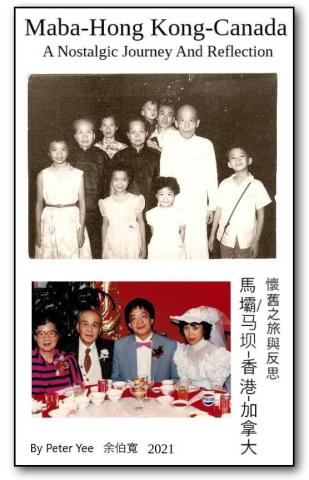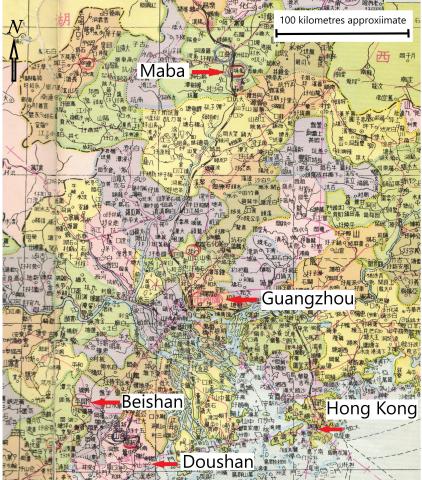Part 1 My Childhood and Teen Years - Guangzhou and Hong Kong
1.0 Preface
The idea of writing my memoir surfaced in 2019 as I was approaching my three-quarter century milestone. I was also impressed by Andrew Suddaby’s book about his early years in England, and National Service in Hong Kong. After reading a short summary of my story, Andrew encouraged me to expand it to a full-blown autobiography. The story here is a collection of events that shaped my life, scenes and voices remembered, friends and neighbours, my work career, and memories of my parents and grandparents. This may not be a full blown autobiography, but I think it captured all of the key events, the highs and lows, happy and sad times, and some in between.
Some of the photos are downloaded from the internet with the source identified wherever possible. If there are copyrights, I would appreciate being informed, and would remove them accordingly.
Peter Yee
August 1, 2020
Sample pages
My grandparents came from Taishan/Toishan (台山), a region on the southern coast of Guangdong province of China and about 140 kilometres west of Hong Kong. Both the two words above refer to the same region, and Toishan’s English pronunciation is closer to how the people there call their home. Some of the villages and towns in their time no longer appear in today’s maps after they became a part of a large municipal entity.
When in their home town, my grandparents…
Mother - 陳玉屏 / CHAN Yuk Ping / Lena Yee (1922-2003) "Ma Ma"
Father – 余欽美 / YEE Ham Mee (1915-2008), Ham in Taishanese dialect "Ba Ba"
We learn from our parents at some point in time when and where we were born. In my case, I learned about it in 1950, one year after our family moved from Guangzhou to Hong Kong. There wasn’t much space for this active five-year old boy to play in grandparents flat. But I made the most of it. When father heard me playing, he would say “你 個 馬 壩 仔! (You Maba baby!)” I could see his smiling face and sense of relief. Mom didn’t say anything, perhaps father’s…


Comments
memoir
what a great idea Peter, looking forward to reading it as you post.
Is there a book in this?
Peter
Have you considered publishing your memoirs as a book? There seems to be a market for this sort of thing, and printing technology these days means that print runs of hundreds rather than thousands can make sense.
You might consider talking to Pete Spurrier at Blacksmith Books who has published other memoirs such as Diamond Hill
Paul
Autobiography Book
Thank you Paul for the suggestion. I have no plan at this time, too early to decide may I say. I'm just sharing the story here with Gwulo's readers in the hope they'll enjoy it.
There is still work to be done, for example, updating and expanding it when I discover something new in my and parents' possessions. Then there is a task yet to write about what happened after I left Hong Kong, which is another part of the story. Regards, Peter
Peter Pak Foon Yee
I loved reading the first piece of your autobiography and look forward to be able to finding the rest. Thank you.
Police and Fish Sellers (1952)
When I was serving in Bayview we used to raid the Yaumati Ferry pier to see-off unlicensed fish and cooked food hawkers. As you say, once caught, they caused no trouble. The upside of this activity was that the orphans and children of the Po Leung Kuk and Begonia Road Boys Home got all the perishable seized hawker food so were regularly very well fed (along with the staff too I suppose...)
Exiting memories
Peter, thank you for sharing your memories of the 1950s. Often stories are more interesting than photos, so it is with your story.
Reading about your time in the early 1950s in Lai Chi Kok, I now know why you were fond of post of Lai Chi Kok Park and beach.
Regards, Klaus
Exiting memories
Thank you Klaus, Guy and Victoria for you comments and support. Regards, Peter
Tak Yan School
Dear Mr. Yee,
A very good read for me. They also seems to fit what my parents experienced as young kids in the 1950 Kowloon.
My father is of same age as you, and he also went to Tak Yan School in 1954. What a co-incident! But he doesn't think you were at the same class as him.
AY
Tak Yan College
Thank you AY for your comments. I sat in the last row in the P5 1954-1955 term, the time that saw the teacher's wooden ruler in action. The female teacher's age I guess was in her mid-20s. If your father did not experience that event, then we were not in the same P5. He will remember the sweet red bean congee sold by a vendor in the school yard, and the pancake vendor on the street outside the school. Regards, Peter
Nostalgic journey
Hello Peter,
Early in your memoir you say your Grandpa Yee went to Saskatchewan. When I was researching my grandfather Kenneth Kingsley Staple last year (he is on Gwulo) I was intrigued to find a 1916 Cenus record (Ancestry I think) of him living as a lodger in a house in Kindersley, Saskatchewan. Also in the household a Frank Lee, aged 21, and Y. Lee, 44, both given as from China, religion Confucian. Both laundrymen. My grandpa, originally from Somerset, England, emigrated to Canada in 1911/12 although by the time of this census he had enlisted for the Great War. In 1919 he sailed for Hong Kong rather than returning to Canada. I've always wondered why. Perhaps meeting these gentlemen, like your grandfather, gave him the idea? Look forward to reading more of your memoir.
Kenneth Kingsley Staple
Thank you debcoxon for your comments and support. I can only speculate. Kindersley, SK was a very small town near Saskatoon, so perhaps the prairie winters might have convinced him not to return to Canada. But we do have places in Canada with climate similar to England's.
HK, a British colony at the time, was likely easier to find a job of his interest. I am not surprised your grandfather met his co-lodgers in Kindersley. In my summer jobs in Saskatchewan, it was not difficult to find a small Chinese restaurant or laundry shop in small towns. Regards, Peter
More on Tak Yan College
Dear Mr. Yee,
I've asked my dad this afternoon, and he said that one of the teachers from his primary five days at Tak Yan was a retired head of [a certain unit] of the [KMT] military. He was very strict to his students and punished the naughty ones severely. E.g. he once ordered a student to swallow rubbish papers on the floor, to sit into the underside of a wooden chair, to hit the knuckles of the hand with a wooden ruler, to sit in front of a wall without touching the wall (a.k.a. 坐空椅)! It sounds way more severe than your female class teacher!
While he didn't remeber the red/azuki bean congee, he remebers the curry squid (咖哩魷魚) from the small shop opposite to the front door of the school. It cost 20 cents for a serving and they delivered through the iron bars of the gate during recesses (小息).
AY
Tak Yan College
Thanks AY for sharing your father's account of his Tak Yan years. "Retired head of KMT military" - sounds like someone my father might have known back in Guangzhou but he was in the civilian service. There was one old teacher who my father called 老師, but I don't know if he was the same teacher. He was not one of my teachers. Regards, Peter
Amazing stories
Hello Peter,
Thank you for sharing your stories and I look forward to reading your new entries. I was very emotional when I read the section about the day that you travelled to Canada, in particular to the lines about how your grandpa and grandma reacted. They were so committed to the family and apprantly did a wonderful job to look after you and your siblings.
I have a question out of curiosity. Why is your surname 余 translated to 'Yee' but not 'Yu'? I believe the character 余 is normally translated to 'Yu' in Hong Kong or the southern part of China in general?
Regards,
Jamie
Pronunciation of Surname 余
Thank you Jamie for your comments. The surname 余 is pronunced Yu in Cantonese, and Yee in Taishanese. Regards, Peter
Interesting account
Your interesting account of life as a school boy resonates with my own experience. I was at a private and then an Anglican primary school, sharing similar experience as you narrated (e.g., playing marbles on the street, reading comics - Uncle Choy, an anti-Japanese hero, and later the hilarious "Old Master and his friends"). Having the palm hit by the teacher with a big wooden ruler was a common punishment for things like forgetting to do one's homework. Finding a secondary school place was another highly difficult task for a primary school leaver. We grew up in the era of singers like Elvis Presley, Pat Boone, Doris Day, Conie Francis, and film stars like Gary Cooper, Cary Grant, Ingrid Bergmen, Audrey Hepburn .... You haven't mentioned the famous Cantonese and Shaw stars, Bruce Lee in his teens, ...
You have brought back many fond memories in my own school days.
TW Wong
Your memoir
Dear Peter,
I am so pleased that all your efforts to document the lives of your parents, grandparents and yourself in China, Hong Kong and Canada have come to fruition. As soon as we met over the Internet, I knew that your account and the many illustrations would resonate with many people of your age and add to the social history of our times. My help has been minimal, mainly in encouraging you to search your memory for things that while perhaps seeming mundane to you would bring back nostalgic memories for others or tell younger people how life was in previous years - often much harder than they might think.
In the process of helping you I have found a new friend and I look forward to continuing our 'penfriendship' for years to come.
Best wishes, Andrew
Memoir in Chinese
I found your memoir really interesting as I also grew up in HK at a similar age. Your experience was similar to mine. I wonder if you would rewrite it in Chinese, I think many Hongkongers who don't have much knowledge of English would be pleased to read it.
Memoir
Thank you ymsitt for your comments. My Chinese language skill was not great to begin with when I left Hong Kong. It is very rusty now with limited vocabulary. Regards, Peter
Memoir in Chinese
It's pity as I think you will have far more readers interesting in your story if it has a Chinese version. Can you find somebody to do the translation?